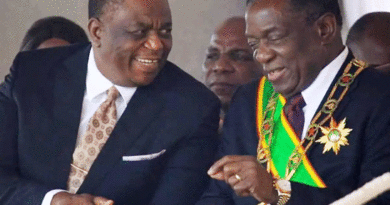Govt bows down to university lecturers’ demands
THE government has bowed down to pressure from university lecturers following protests over poor salaries amid bribery revelations that senior government officials and legislators are allegedly paying lecturers to be awarded good grades.
University lecturers, led by members of the Association of University Teachers (AUT) from the University of Zimbabwe (UZ), engaged in demonstrations at the institutions demanding improved working conditions, including a salary review.
UZ vice-chancellor Paul Mapfumo suspended AUT members and later lifted the suspension but they adamantly picketed at the university before they were arrested.
The lecturers approached the courts, where their demonstrations were given the nod before the UZ revoked the suspensions last week.
The government yesterday said President Emmerson Mnangagwa had intervened on behalf of the university teachers.
Presidential spokesperson George Charamba confirmed that Mnangagwa had approved welfare improvements for lecturers, stating on X (formerly Twitter): “YOU HAVE BEEN
HEARD!!! Government is addressing the welfare of University Lecturers… The Chancellor, Dr E D Mnangagwa, had long approved recommendations which should have put this matter well behind us.”
Charamba accused some unnamed officials in government of sitting on the recommendations, which should have seen a pay rise for lecturers.
However, the government’s intervention comes against the backdrop of deep-rooted corruption in the academia, with accusations that lecturers are accepting bribes, fuel coupons and soft loans from high-ranking students, including ministers and Members of Parliament, in exchange for good grades.
Last week’s strike by University of Zimbabwe lecturers not only highlighted their paltry salaries, as low as US$230 per month, but also exposed an underground economy where powerful students buy academic success.
The scandal has raised fresh concerns over the erosion of academic standards in Zimbabwe’s higher education system. The most prominent case was that of the arrest of former UZ vice-chancellor Levi Nyagura over the suspected fraudulent awarding of a doctorate degree to former First Lady Grace Mugabe.
Nyagura was arrested by the Zimbabwe
Anti-Corruption Commission (Zacc) following an investigation into awarding of the PhD.
It emerged that Mugabe was awarded the degree by the university in 2014 after just few months of study.
Doctorates typically require several years of full-time research and writing.
In an interview with NewsDay, AUT treasurer Obvious Vengeyi acknowledged that there are reports of “incentives for grades” in universities, but was quick to point out that there was no tangible evidence to back up the allegations.
“We are worried about reports of lecturers being given money and fuel coupons by senior government officials to influence grades . . . It is happening, but we lack tangible proof,” he said.
One lecturer, speaking anonymously, admitted: “Imagine getting a lift home from a Cabinet minister, plus some extra cash — how do you refuse to help them pass?”
Another lecturer chipped in: “This is why standards are falling. Our dignity is being sold for survival.”
Mugabe was in 2014, controversially awarded a PhD degree in Sociology by UZ after just three months of study, a process that normally takes years.
Allegations swirled that faculty members were coerced into fast-tracking the process, exposing political interference with the academia. Newsday




